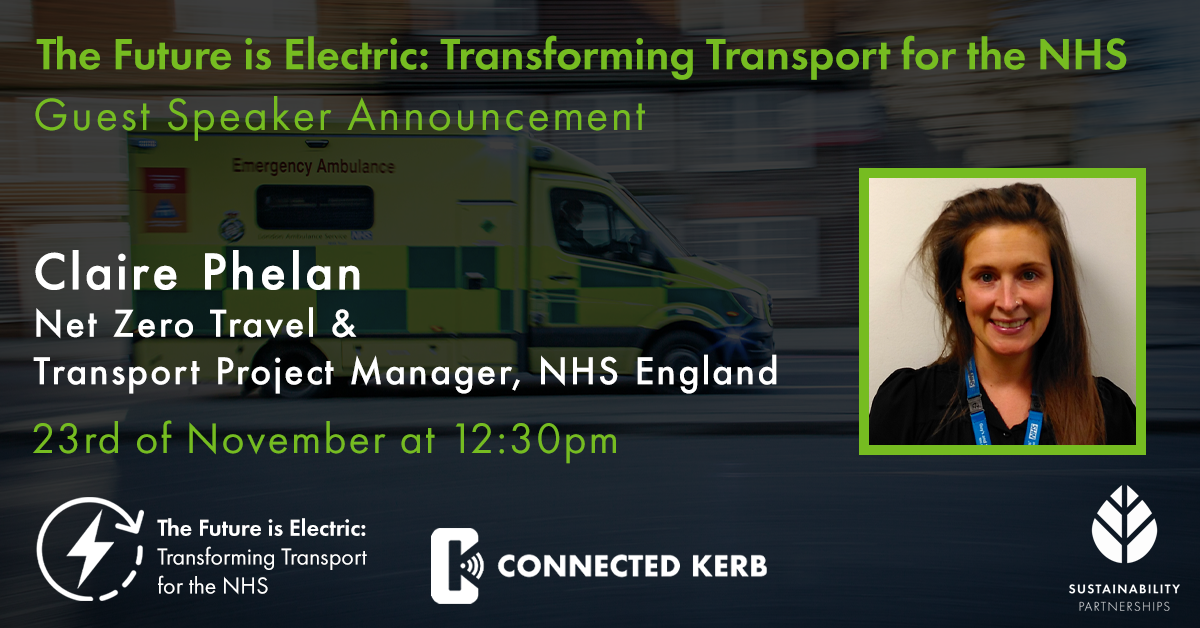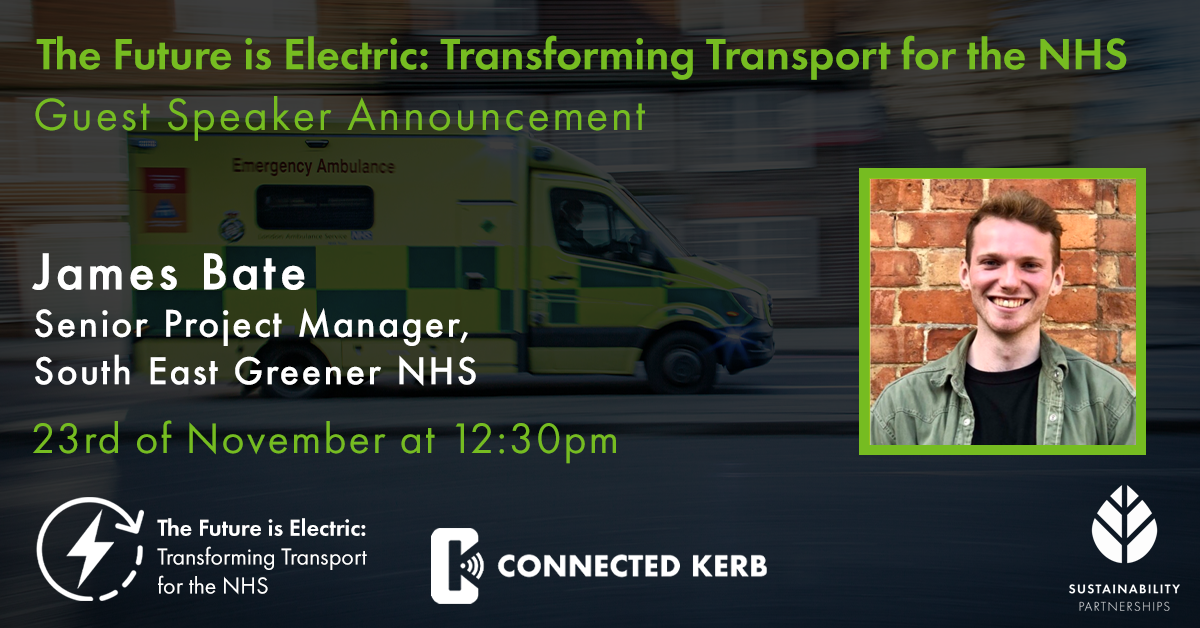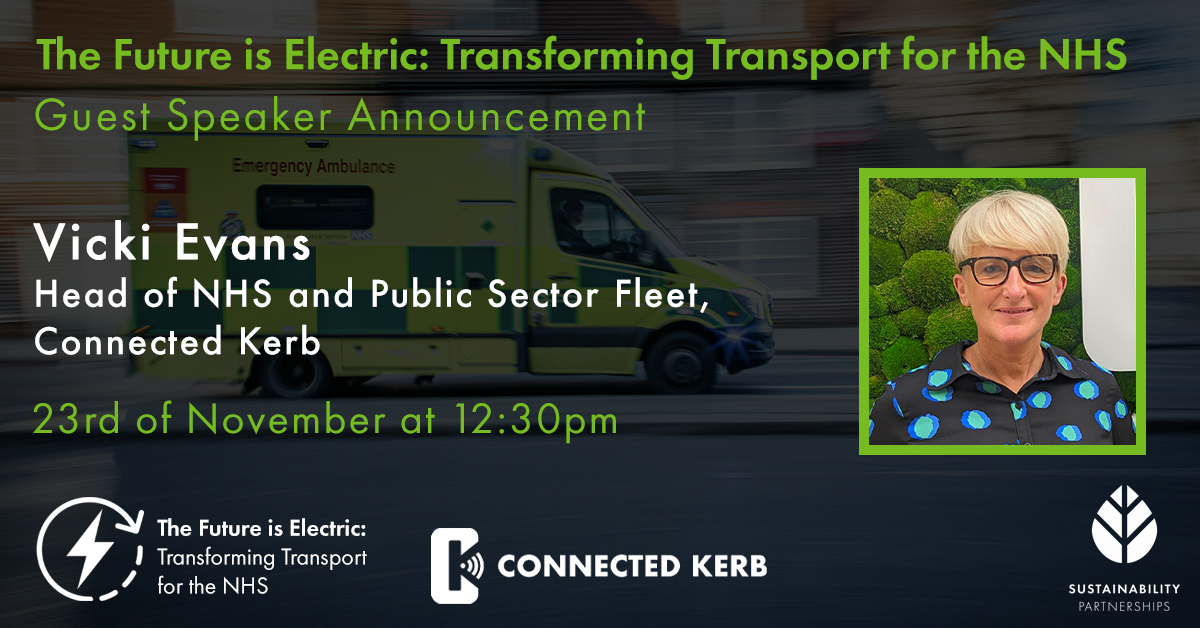Connected Kerb presents: The Future is Electric: Transforming Transport for the NHS
With less than eight years before the sale of new petrol and diesel vehicles is banned within the UK, the race to get our country set up for a full transition to electric vehicles (EV) is well underway. Connected Kerb are experts in building a world where sustainable vehicle travel can be a reality for everyone – especially for those within our National Health Service.
From exploring what NHS staff need from charging to debating charging speeds – where quick isn’t always best - to how to find a charger and using it and examining funding options. This session run by Connected Kerb dug deep into how Electric Vehicles (EV’s) could help to support the NHS in building a greener future and how they can help to build the necessary infrastructure.
Claire Phelan Net Zero Travel & Transport Project Manager, NHS England
Claires presentation kicked off with an overview of the current national picture of the NHS’s overall vehicle fleet, pointing out that the NHS operates an owned and leased fleet of over 22,000 vehicles.
Her presentation then went on to talk about internal research done to find out what Trust’s capacity to switch to EV would be.
“If we look at all road travel within the UK, around 5% is from the NHS so we can have a big impact if we reduce our emissions.”
“Emergency vehicles are a very time sensitive resource and require rapid turnaround. But we have some option that could combat this such as the sharing of charging points with other emergency services such as the police or event point at bus stops.”
Our attendees were then given a list of the key challenges the NHS could face in switching to electric vehicles, from a lack of understanding on where to start, through to the fact that 10-15% of Trusts fleet vehicles are kept at employee’s homes.
Claire went on the explain the progress that has been made so far by her department and the number of steps that could push the NHS towards the use of greener vehicles, including the potential use of hydrogen. Claire then dug into the effect of things such as regional disparity on the ability to transition to electric fleets and the comparison between the NHS’s timeline and the predicted public trajectory for transition to EV.
“Collaborative working and a holistic whole system approach is going to be the key to making this happen.”
James Bate, Senior Project Manager, Greener NHS, NHS England & Improvement, South East Region
James followed on from Claires presentation with a regional view in comparison to Claire’s national team view. James explained the Greener NHS fleet return recently conducted to outline the percentage of EVs across their fleets and the amount of EV chargers on site.
“I see Green Plans as being an ultimate opportunity to drive coordinated, joined up working across our system partners, with local authorities and with the NHS. There’s no point one group installing a substation and then a Trust installing another one five miles down the road, we can work together on this.”
He ran through some of the key stakeholders supporting some of the regional development in EV charging and the infrastructure needed.
“It’s important that the NHS does not work alone, we need to drive efficiency and that can only be doing using a joined-up approach”
Dr. Chris Pateman-Jones, Chief Executive Officer, Connected Kerb
Chris gave the attendees an overview of the history of Connected Kerb. He then went on to speak about the difficulties often experienced by those looking to consider transitioning to an EV without the ease of a driveway. He explained how Connected Kerb was created to solve this issue with a reliable, affordable and convenient solution.
“You can guarantee that 95% of the people who currently own an electric vehicle will have a driveway they are able to park and charge their car on. If you don’t have a driveway and need to park on the street or in a carpark it can be really difficult to charge.”
“We want to show that we are a trusted partner, our goal is to work with the NHS in the long run as we see you as being a real catalyst for change. What’s different about us is our score when it comes to our level of service and reliability, which some other large networks have failed a little bit on.”
He spoke about the huge opportunity that NHS has to be a catalyst for change in the electric vehicle landscape. He also spoke about the difference electric vehicle use can make to people’s health due to the improvement in air quality. Chris then spoke about how Connected Kerbs growth over the past year has allowed them to become one of the largest charging networks within the UK, even overtaking BP Pulse.
Chris also spoke about the fact that they had secured Aviva investors and were therefore backed by long-term, patient, ecologically and environmentally focussed organisation that really cares about social inclusion. He explained how they screened out investors coming from oil and gas background and focussed on investment that spoke true to their own values.
Vicki Evans, Head of NHS and Public Sector Fleet, Connected Kerb
Next up we had Vicki Evans, Vicki began her presentation by explaining how important it is to understand the challenges that energy and estates managers across the NHS face with being able to budget and manage energy. She also spoke about how other huge projects such as EV have been given to people within roles who were already stretched.
“I thought it would be a really good time to bring my experience working with some of the largest electric vehicle providers together along with working at Crown Commercial Services, which give me the understanding of the procurement and regulations there, to do something with the NHS and show our support.”
“At Connected Kerb, we pride ourselves and consistently question ourselves on our product development and ask ourselves questions such as; are we being sustainable, and are we fully aware of our environment?”
Vicki spoke about how she worked with her connections to figure out what the barriers were to the NHS electrifying their fleet, learning that the differing stakeholder goals along with the potential size and complexity of the project were a big factor. She explained how she used all of this data at Connected Kerb to pull together potential options for the NHS.
Vicki spoke about the internal developments they are always making to ensure their chargers are the most sustainable, including ensuring that the chargers are repurposed at the end-of-life stage. She explained the huge efforts that Connected Kerb go to, to educate their clients on the projects they are entering into to ensure they are fully aware of what they are entering into and how it is going to benefit them into the future.
“We will ensure that we are working on the best chargers to achieve the goals that you set out to hit. For example, the capacity that you have on site is an element we seriously consider when looking into your solutions.”
Finally, Vicki explained the lengthy benefits of working with Connected Kerb specifically, from the fact that they offer a future-proof, flexible and scalable infrastructure, to their unrivaled customer service.
Rounding Up
The event then ended with a highly energetic question and answer session.
Connected Kerb works hard to offer sustainable solutions to help organisations in making the switch to electric vehicles. They have a large focus on making electric accessible for everyone, especially for our National Health Service. You can find out more about how they can support you on their website or contact them for further information.




